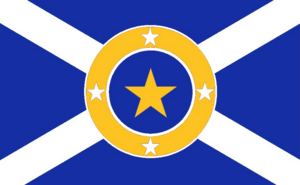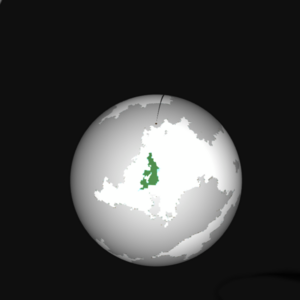West Florida
This article is incomplete because it is pending further input from participants, or it is a work-in-progress by one author. Please comment on this article's talk page to share your input, comments and questions. Note: To contribute to this article, you may need to seek help from the author(s) of this page. |
The National Presidential Republic of West Florida, Commonly called Florida, is a large country located on the continent of Norland consusting of 11 states, which are each divided into 50 counties each.
The National Presidential Republic of West Florida La República Presidencial Nacional de Florida Occidental | |
|---|---|
|
Flag | |
| Motto: Independence | |
| Anthem: Johnny B. Goode Royal anthem: God save the king | |
| Capital | Baton Rouge |
| Largest City | Pensacola |
| Official languages | Floradian |
| Recognised national languages | English, Spanish, French, Floradian |
| Recognised regional languages | Seminole, Caddo, Creek, Cherokee |
| Ethnic groups | Caucasian, African, Native Floradian |
| Demonym(s) | Floradian |
| Government | De Jure Presidential republic/De facto Military Dictatorship |
• Supreme commander | George Patton |
• President | Tony Steele |
| Legislature | Unicameral General Assembly |
| Independent | |
• Storming of the fort | September 23, 1810 |
• Unification Day | September 26, 1810 |
| Population | |
• 2015 estimate | 11.5 million |
• 2020 census | 12 million |
| GDP (PPP) | 2020 estimate |
• Total | 600 Billion (7) |
• Per capita | $50,000 (6) |
| Currency | Dollar (FLD) |
| Time zone | UTC0 (UTC) |
| Driving side | right side |
Etymology
The Word Florida came from the Floradian words “tierra de flores”, which means land of flowers, which is common in the southern regions.
History
Government and Politics
The Republic of West Florida is a Federal Republic with 11 states with 50 counties in each state. However the Republic is a republic in name only, and is ruled by the military in reality. In theory the government is a weaker government, with most of the power in the hands of the states.
Legislative
The Legislative branch is made up of the unicameral General Assembly, which has 550 seats. The General Assembly makes federal laws, declares war, approves treaties, has the power of the purse, and has the power of impeachment, by which it can remove sitting members of the government from every branch except the militant branch.
Executive
The president is the commander-in-chief of the military, can veto legislative bills before they become law (subject to GA override), and appoints the members of the Cabinet (subject to GA approval) and other officers, who administer and enforce federal laws and policies.

